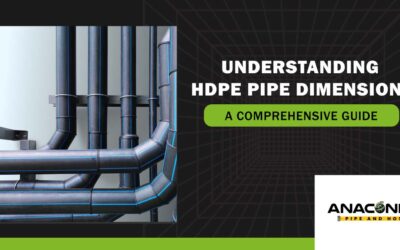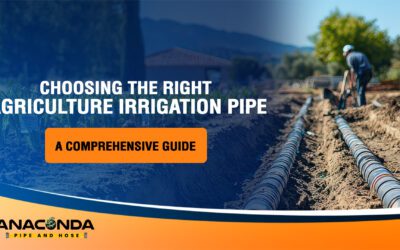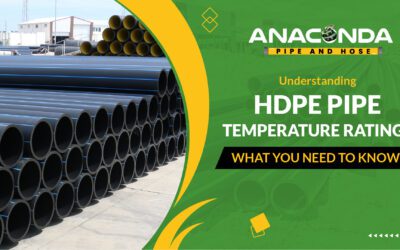In the fast-paced realm of industrial operations, the efficiency of piping systems is of utmost importance. These systems are the backbone of numerous processes, ensuring a seamless and uninterrupted flow of materials. Among the diverse types of pipes used in industries, sludge pipes stand out for their unique capabilities and advantages. These pipes play a crucial role in maintaining operational efficiency and are specifically designed to handle the challenging task of transporting sludge—a common and often difficult byproduct of industrial processes. This in-depth blog delves into the world of dredge pipes, highlighting their definition, applications, unique benefits, and key considerations for selecting and maintaining them to optimize efficiency in industrial applications.
Understanding Sludge Pipes
Definition and Composition of Sludge Pipes
Sludge pipes are the workhorses of the industrial world, engineered to manage and transport a semi-solid slurry comprising a diverse range of materials, including industrial waste, sewage, and other byproducts. This complex composition demands pipes that are not just strong, but resilient. Typically, dredge pipes or the flat pipes are crafted from high-density polyethylene (HDPE), steel, and specialized alloys. Each of these materials is handpicked for its unique ability to withstand the harsh conditions encountered in industrial environments. HDPE, for instance, is renowned for its flexibility and chemical resistance, while steel is celebrated for its strength and durability. Specialized alloys combine these attributes, offering a winning combination of durability and longevity.
Key Characteristics that Make Sludge Pipes Suitable for Industrial Use
The standout features that make sludge pipes a top choice for industrial applications are their exceptional resistance to wear and tear, corrosion, and chemical reactions. These pipes are engineered to thrive in high-pressure environments, enabling the transportation of sludge over significant distances without compromising their structural integrity. The smooth interior surfaces of sludge pipes are a game-changer, significantly reducing friction, ensuring efficient flow, and minimizing the risk of blockages. Moreover, their ability to withstand extreme temperatures and abrasive materials makes them a versatile and reliable option for a wide range of industrial applications.
Applications of Sludge Pipes in Various Industries
Use of Sludge Pipes in Wastewater Treatment
Wastewater treatment plants heavily rely on dredge pipes to transport sludge through different stages of the treatment process. These pipes are crucial in moving sludge from primary clarifiers to digesters and from digesters to dewatering units. The robust nature of sludge pipes ensures they can handle the sludge’s high solid content and corrosive nature, thus maintaining efficient and reliable operations. The ability of these pipes to endure the harsh conditions within wastewater treatment facilities highlights their indispensable role in this industry.
Role of Sludge Pipes in Mining Operations
Mining operations generate substantial waste material that must be transported and managed effectively. Sludge pipes transport mine tailings—a mixture of water, rock particles, and chemical agents used in the extraction process. The abrasive nature of the tailings and the chemicals used in mining necessitate durable and corrosion-resistant pipes. Dredge pipes meet these requirements, ensuring mining operations continue smoothly without frequent pipe maintenance or replacement interruptions.
Application in Chemical Processing Plants
Chemical processing plants often handle hazardous and corrosive materials that require safe transportation. Sludge pipes are utilized in these plants to transport such materials, ensuring that the pipes can withstand harsh conditions and prevent leaks or ruptures. The resistance of flat pipes to chemical reactions is a crucial factor in their selection for these applications. Sludge pipes play a vital role in maintaining the integrity of chemical processing operations by preventing contamination and ensuring the safe transport of chemicals.
Use in the Oil and Gas Industry
The oil and gas industry also relies heavily on sludge pipes for various applications, including the transportation of drilling mud and the management of oil sludge. These pipes must withstand the harsh conditions of drilling environments, including exposure to high pressures and corrosive materials. Dredge pipes made from specialized alloys are particularly suited for this industry, offering the necessary durability and resistance to ensure smooth operations.
Application in the Food and Beverage Industry
Even the food and beverage industry benefits from using sludge pipes, particularly in managing waste materials and byproducts. Flat pipes transport organic waste and byproducts from food processing plants to treatment facilities. This industry’s hygienic requirements necessitate pipes that are easy to clean and resistant to contamination. HDPE sludge pipes are often preferred for their smooth interior surfaces and ease of maintenance.
Benefits of Using Sludge Pipes
Durability and Longevity in Harsh Conditions
One of the foremost benefits of sludge pipes is their exceptional durability. Designed to last in harsh industrial environments, these pipes significantly reduce the need for frequent replacements and minimize operational downtime. Their longevity translates to considerable cost savings and enhanced efficiency in industrial operations. The ability of sludge pipes to endure extreme temperatures, abrasive materials, and high-pressure environments underscores their suitability for a wide range of industrial applications.
Resistance to Corrosion and Chemical Reactions
Sludge pipes are engineered to resist corrosion and chemical reactions, which are essential in industries that handle corrosive and abrasive materials. This resistance ensures the integrity of the pipes over time, reducing the risk of leaks and environmental contamination. By maintaining their structural integrity under harsh conditions, flat pipes contribute to safer and more efficient industrial operations. This characteristic is particularly crucial in chemical processing and mining industries, where the materials transported can be highly corrosive.
Cost-Effectiveness in Long-Term Operations
While the initial investment in high-quality dredge pipes might be higher than other options, their long-term cost-effectiveness is undeniable. The reduced need for maintenance, repairs, and replacements, coupled with their efficiency in operations, makes them a cost-effective choice for industrial applications. Sludge pipes offer substantial financial benefits over time by minimizing operational interruptions and extending the lifespan of the piping system.
Environmental Benefits
Using dredge pipes can also provide environmental benefits by preventing leaks and spills that could contaminate soil and water sources. Sludge pipes help industries comply with environmental regulations and reduce their environmental footprint by ensuring the safe transportation of waste materials. This contributes to a safer and cleaner environment, benefiting the industry and the community.

Selecting the Right Sludge Pipe for Your Needs
Factors to Consider When Choosing a Sludge Pipe
Several critical factors must be considered to ensure optimal performance when selecting a dredge pipe. These include:
- Type of Sludge: The composition of the sludge being transported plays a significant role in determining the appropriate pipe material. Different types of sludge have varying abrasiveness and chemical reactivity levels, which must be matched with the pipe’s material properties.
- Distance and Pressure Requirements: The length of the pipeline and the pressure conditions it will face are crucial considerations. Pipes must handle the required pressure without compromising their structural integrity.
- Environmental Conditions: Factors such as temperature extremes, exposure to UV radiation, and environmental corrosive elements must be considered.
- Chemical Composition: The chemical makeup of the sludge can influence the choice of pipe material, as certain materials offer better resistance to specific chemicals.
By carefully evaluating these factors, industries can select sludge pipes that meet their specific needs and ensure reliable performance.
Comparison of Different Materials Used in Sludge Pipes
Different materials used in dredge pipes offer various advantages and limitations:
- HDPE Pipes: Known for their flexibility, chemical resistance, and ease of installation, HDPE pipes are widely used in various industrial applications. They are lightweight, corrosion-resistant, and have a smooth interior surface that reduces friction and prevents blockages. However, they may only be suitable for some high-pressure applications.
- Steel Pipes: Steel pipes are ideal for high-pressure environments and offer superior strength and durability. They are highly resistant to wear and tear but may require protective coatings to resist corrosion, especially in corrosive environments. Steel pipes are heavier and more challenging to install compared to HDPE pipes.
- Specialized Alloys: These pipes combine the best attributes of both HDPE and steel, offering enhanced durability, chemical resistance, and strength. While they are more expensive, their long lifespan and reliability often justify the higher initial cost.
Understanding the properties of each material is crucial in making an informed decision that balances performance, cost, and durability.
Installation and Maintenance Tips
Best Practices for Installing Sludge Pipes
Proper installation of flat pipes is essential to ensure their performance and longevity. Here are some best practices to follow:
Proper Alignment: Ensuring that the pipes are properly aligned during installation prevents undue stress and potential points of failure.
Appropriate Fittings: The correct fittings and connectors ensure a secure and leak-free pipeline.
Securing the Pipes: Properly securing the pipes prevents movement and vibration, leading to wear and potential failure over time.
Inspection During Installation: Regular inspection during the installation process helps identify and address potential issues early on, ensuring a high-quality installation.
Regular Maintenance Procedures to Ensure Optimal Performance
Maintaining dredge pipes involves regular inspection and cleaning to prevent blockages and buildup of materials. Essential maintenance procedures include:
Routine Inspections: Regularly inspecting the pipes for signs of wear, corrosion, and potential damage helps identify issues before they become critical.
Cleaning: Periodically cleaning the pipes to remove buildup of sludge and other materials ensures smooth flow and prevents blockages.
Monitoring: Continuously monitoring the piping system’s performance helps detect deviations from optimal performance and allows for timely intervention.
Record Keeping: Keeping detailed records of maintenance activities, inspections, and repairs helps track the pipes’ condition and plan future maintenance activities.
Advanced Monitoring and Predictive Maintenance
With advancements in technology, industries can now employ advanced monitoring systems to track the performance and condition of flat pipes in real time. These systems use sensors to monitor pressure, flow rate, and temperature. The data collected can be analyzed to predict potential issues before they occur, allowing for proactive maintenance and reducing the risk of unexpected failures. Predictive maintenance extends the lifespan of flat pipes and enhances overall operational efficiency.
Training and Safety
Proper training of personnel involved in installing and maintaining dredge pipes is crucial. Ensuring that workers are well-versed in best practices and safety protocols minimizes the risk of accidents and ensures the pipes are handled correctly. Regular training sessions and safety drills can keep the workforce updated on the latest techniques and safety standards.
Case Studies and Real-World Examples
Case Study 1: Wastewater Treatment Plant
A large wastewater treatment plant faced frequent pipe blockages and corrosion issues, leading to operational disruptions and increased maintenance costs. After switching to high-density polyethylene (HDPE) flat pipes, the plant experienced a significant reduction in blockages and maintenance requirements. The smooth interior surface of the HDPE pipes minimized friction and prevented buildup, while their chemical resistance ensured longevity in the corrosive environment. The plant reported a 30% reduction in maintenance costs and improved overall efficiency.
Case Study 2: Mining Operation
A mining company struggled and needed help with the durability of their existing steel pipes to transport abrasive mine tailings. The pipes frequently required repairs and replacements due to wear and tear. The company decided to switch to specialized alloy flat pipes that offered enhanced durability and resistance to abrasion. The new pipes significantly reduced downtime and maintenance costs, allowing the mining operation to run more smoothly and efficiently. The long-term savings and improved productivity offset the initial investment in specialized alloy pipes.
Case Study 3: Chemical Processing Plant
A chemical processing plant dealing with highly corrosive materials faced challenges with their traditional steel pipes. The frequent corrosion led to leaks and contamination issues. The plant opted for HDPE dredge pipes, which provided excellent resistance to chemical reactions. The transition significantly reduced leaks and contamination incidents, ensuring safer and more reliable operations. The plant also benefited from the ease of installation and maintenance associated with HDPE pipes.

Future Trends in Sludge Pipe Technology
Innovations in Materials
The development of new materials and composites continues to advance the capabilities of sludge pipes. Researchers are exploring nanomaterials and advanced polymers that offer excellent resistance to corrosion, abrasion, and chemical reactions. These innovations promise to enhance flat pipes’ durability and efficiency further in industrial applications.
Smart Pipes and IoT Integration
Integrating Internet of Things (IoT) technology into dredge pipes is an emerging trend with great potential. Innovative pipes with sensors can provide real-time data on various parameters, allowing for precise monitoring and control. This technology enables predictive maintenance, early detection of issues, and optimization of pipeline performance. Industries can leverage this data to make informed decisions and improve operational efficiency.
Sustainable and Eco-Friendly Solutions
As industries strive to reduce their environmental impact, a growing focus is on developing sustainable and eco-friendly sludge pipe solutions. This includes using recycled materials, biodegradable coatings, and energy-efficient manufacturing processes. By adopting sustainable practices, industries can minimize their carbon footprint and contribute to a greener future.
Conclusion
In conclusion, sludge pipes are vital in many industrial applications, offering exceptional durability, resistance to corrosion, and long-term cost-effectiveness. Industries can maximize efficiency and ensure smooth operations by understanding their properties, applications, and maintenance requirements. Selecting the suitable flat pipe tailored to the specific needs of your application can lead to significant long-term benefits, making these pipes an essential part of industrial infrastructure.
As industries evolve and face new challenges, the importance of reliable and efficient flat pipes will only grow. By optimizing your piping systems with high-quality sludge pipes, you can enhance operational efficiency, reduce downtime, and achieve substantial cost savings. Investing in suitable dredge pipes today will pay dividends in the form of increased reliability and performance in the future.
Whether you are involved in wastewater treatment, mining, chemical processing, or any other industry requiring robust piping solutions, flat pipes offer the reliability and efficiency needed to meet your operational demands. By prioritizing the selection, installation, and maintenance of these pipes, you can ensure the seamless flow of materials and contribute to the overall success of your industrial operations.
Incorporating advanced technologies and sustainable practices further enhances the benefits of sludredge dge pipes, paving the way for a more efficient and eco-friendly future. As you consider the best piping solutions for your industrial needs, remember the critical role that dredge pipes play in maximizing efficiency and ensuring long-term success.







0 Comments